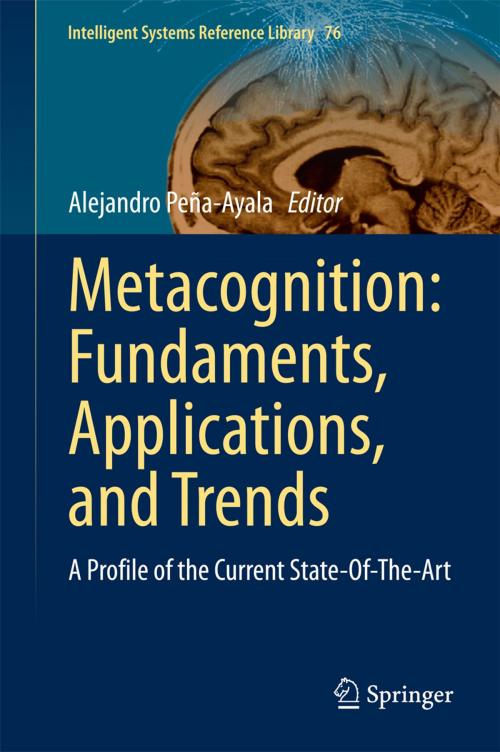Metacognition: Fundaments, Applications, and Trends
A Profile of the Current State-Of-The-Art
Nonfiction, Computers, Advanced Computing, Artificial Intelligence, Reference & Language, Education & Teaching, Educational Theory, Educational Psychology, General Computing| Author: | ISBN: | 9783319110622 | |
| Publisher: | Springer International Publishing | Publication: | October 30, 2014 |
| Imprint: | Springer | Language: | English |
| Author: | |
| ISBN: | 9783319110622 |
| Publisher: | Springer International Publishing |
| Publication: | October 30, 2014 |
| Imprint: | Springer |
| Language: | English |
This book is devoted to the Metacognition arena. It highlights works that show relevant analysis, reviews, theoretical, and methodological proposals, as well as studies, approaches, applications, and tools that shape current state, define trends and inspire future research. As a result of the revision process fourteen manuscripts were accepted and organized into five parts as follows:
· Conceptual: contains conceptual works oriented to: (1) review models of strategy instruction and tailor a hybrid strategy; (2) unveil second-order judgments and define a method to assess metacognitive judgments; (3) introduces a conceptual model to describe the metacognitive activity as an autopoietic system.
· Framework: offers three works concerned with: (4) stimulate metacognitive skills and self-regulatory functions; (5) evaluate metacognitive skills and self-regulated learning at problem solving; (6) deal with executive management metacognition and strategic knowledge metacognition.
· Studies: reports research related to: (7) uncover how metacognitive awareness of listening strategies bias listening proficiency; (8) unveil how metacognitive skills and motivation are achieved in science informal learning; (9) tackle stress at learning by means of coping strategies.
· Approaches: focus on the following targets: (10) social metacognition to support collaborative problem solving; (11) metacognitive skills to be stimulated in computer supported collaborative learning; (12) metacognitive knowledge and metacognitive experiences are essential for teaching practices.
· Tools: promotes the use of intelligent tutoring systems such as: (13) BioWorld allows learners to practice medical diagnostic by providing virtual patient cases; (14) MetaHistoReasoning provides examples to learners and inquiries about the causes of historical events.
This volume will be a source of interest for researchers, practitioners, professors, and postgraduate students aimed at updating their knowledge and finding targets for future work in the metacognition arena.
This book is devoted to the Metacognition arena. It highlights works that show relevant analysis, reviews, theoretical, and methodological proposals, as well as studies, approaches, applications, and tools that shape current state, define trends and inspire future research. As a result of the revision process fourteen manuscripts were accepted and organized into five parts as follows:
· Conceptual: contains conceptual works oriented to: (1) review models of strategy instruction and tailor a hybrid strategy; (2) unveil second-order judgments and define a method to assess metacognitive judgments; (3) introduces a conceptual model to describe the metacognitive activity as an autopoietic system.
· Framework: offers three works concerned with: (4) stimulate metacognitive skills and self-regulatory functions; (5) evaluate metacognitive skills and self-regulated learning at problem solving; (6) deal with executive management metacognition and strategic knowledge metacognition.
· Studies: reports research related to: (7) uncover how metacognitive awareness of listening strategies bias listening proficiency; (8) unveil how metacognitive skills and motivation are achieved in science informal learning; (9) tackle stress at learning by means of coping strategies.
· Approaches: focus on the following targets: (10) social metacognition to support collaborative problem solving; (11) metacognitive skills to be stimulated in computer supported collaborative learning; (12) metacognitive knowledge and metacognitive experiences are essential for teaching practices.
· Tools: promotes the use of intelligent tutoring systems such as: (13) BioWorld allows learners to practice medical diagnostic by providing virtual patient cases; (14) MetaHistoReasoning provides examples to learners and inquiries about the causes of historical events.
This volume will be a source of interest for researchers, practitioners, professors, and postgraduate students aimed at updating their knowledge and finding targets for future work in the metacognition arena.















